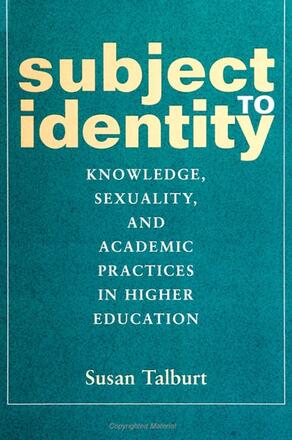
Subject to Identity
Knowledge, Sexuality, and Academic Practices in Higher Education
Alternative formats available from:
Challenges the ways "lesbian academics" have been socially constructed.
Description
This interpretive ethnography explores the academic practices of three lesbian faculty members at Liberal U. , a public research university. Drawing on poststructural theories, the text takes readers beyond constructions of lesbian faculty that rely on identity, voices, and visibility to consider the construction and shifting meanings of academic research, teaching, and collegial relations in practice. Talburt depicts the complicated relations of knowledge, identity, and sexuality as interrelated terms whose meanings are constructed as contingent possibilities. This book challenges us to rethink policy and practice, identity and difference, and knowledge and ignorance as lived and created in constantly shifting networks of relation.
Susan Talburt is Assistant Professor in the Department of Educational Policy Studies at Georgia State University. She is coeditor of Thinking Queer: Sexuality, Culture, and Education.
Reviews
"A carefully conceived, brilliantly executed piece of work. " — William F. Pinar, coeditor of Understanding Curriculum as Racial Text: Representations of Identity and Difference in Education
"…by means of elegantly executed fieldwork, Talburt has produced a compelling portrait of the practices that both constitute, and are constituted by, successful female academics who are ambivalent about taking up lesbian identity in their professional culture. " — Qualitative Studies in Education
"The combination of respect for participant stories and sophisticated methodological understanding of the limits of 'authenticity' and 'voice' kept me turning the pages. The crisis of representation cuts across disciplines. This book enacts a way to use the ruins of correspondence theories of the real as a fruitful site for practices of doing and reporting feminist qualitative research that is lively, readable, and focused. " — Patti Lather, author of Getting Smart: Feminist Research and Pedagogy within the Postmodern
"I find this book compelling on a number of levels. Perhaps most interesting to me are the ways in which the author renders complex performances that depict three very different women—each a 'lesbian academic'—putting the codified space of the academy to new uses, thereby engendering new modes of thought that bring us beyond identity categories, visibility politics and a reliance on tropes of voice. These are extraordinary achievements. " —Paula M. Salvio, University of New Hampshire